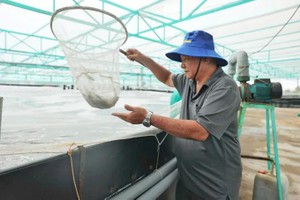
After seven years of implementation, city enterprises that participated in the program had gained valuable experience and effectively stockpiled goods, which helped control market prices, said Nguyen Thi Hong, deputy chairwoman of the city People’s Committee.
She made the statement during a recent meeting to discuss preliminary findings of this year’s program.
A good stockpile plan provides a solid foundation for city businesses to succeed while controlling the price of goods by ensuring appropriate quantities in the market, Ms. Hong added.
This year, participating firms set up a retail system of 1,508 outlets, three times higher than in 2009, that sold goods at fair prices. In addition, the Department of Industry and Trade established a hotline to help the program’s steering board uncover pricing violations while monitoring supply and demand in the marketplace.
The program’s management committee also dispatched large quantities of goods to areas where commodity prices had been pushed up by small-scale traders.
Vissan, the country’s leading meat processor, for instance, transferred 300 kilograms of pork to the Thu Duc market to cool down rising prices.
In Can Gio District, the price of eggs had risen ahead of Tet, so poultry product suppliers Ba Huan and Huynh Gia Huynh De cooperated to form a 100-vendor group to sell eggs at fair prices to consumers.
The price of other essential goods also remained stable in city areas with program participants.
The price of fruits and vegetables, for instance, did not see any sharp increases during the busy holiday season, as the city had instructed Saigon Co.op and Vissan to increase their stockpiles.
Consumers also benefited when Co.opMart and Big C supermarkets even lowered the cost of several essential goods by 5-25 percent before Tet.
Officials say the measures led a low increase in the city’s consumer price index (CPI) during Tet, which rose just 1.68 percent. Hanoi, meanwhile, saw its CPI rise 2.61 percent during the same period.
On average, Vietnam’s CPI rose around 2 percent over the holidays, with HCMC boasting the country’s highest retail revenues in the first two months of this year.
HCMC’s price stabilization program has also had the positive effect of establishing direct relationships between manufacturers and distributors, which reduces intermediary costs and helps firms communicate better with suppliers.
A close relationship between major firms in the city has likewise been formed through a widespread distribution network.
Accordingly, consumers can buy Vissan, Ba Huan, and Vinh Thanh Dat products at Fooco Mart. While Co.opMart continues to offer consumers several essential goods at stable, and reasonable prices.
Firms also dispatched more than 520 vendor trucks to serve consumers in rural areas.
The stabilization program has spread its influence to other provinces in the country, Ms. Hong said, adding that this could be a foundation for the city to start a project that would stabilize prices throughout the year.
The project, which the Department of Industry and Trade has been tasked with assessing in full by April this year, is expected to help control inflation and highlight Government involvement in socioeconomic matters.
























